Homer: The Odyssey
Book IX
Translated by A. S. Kline © Copyright 2004 All Rights Reserved
This work may be freely reproduced, stored and transmitted, electronically or otherwise, for any non-commercial purpose. Conditions and Exceptions apply.
Contents
- Bk IX:1-62 Odysseus tells his tale: The Cicones
- Bk IX:63-104 Odysseus tells his tale: The Lotus-Eaters
- Bk IX:105-151 Odysseus tells his tale: The Land of the Cyclopes
- Bk IX:152-192 Odysseus tells his tale: The Cyclops’ Cave
- Bk IX:193-255 Odysseus tells his tale: Polyphemus returns
- Bk IX:256-306 Odysseus tells his tale: Trapped
- Bk IX:307-359 Odysseus tells his tale: Offering the Cyclops wine
- Bk IX:360-412 Odysseus tells his tale: Blinding the Cyclops
- Bk IX:413-479 Odysseus tells his tale: Escape
- Bk IX:480-525 Odysseus tells his tale: Telemus’ prophecy
- Bk IX:526-566 Odysseus tells his tale: Polyphemus’ curse
BkIX:1-62 Odysseus tells his tale: The Cicones
Resourceful Odysseus answered the king, saying: ‘Lord Alcinous, most illustrious of men, it is a fine thing, in truth, to hear a bard such as this, with a godlike voice. I say myself there is nothing more delightful than when all the people feel this joy, and the banqueters sit in their rows, listening to the minstrel in the hall, tables in front of them laden with meat and bread, while the steward pours wine from the bowl, and carries it round and fills the cups. It seems the loveliest thing of all to me.
But your heart prompts you to ask of my sad troubles, and make me weep and groan the more. How shall I start and end my tale? First let me give you my name, so you all know, and if I escape from pitiless fate later, I will play host to you, though I live far off. I am Odysseus, Laertes’ son, known to all for my stratagems, and my fame has reached the heavens. My home is under Ithaca’s clear skies: our Mount Neriton, clothed with whispering forest is visible from afar: and clustered round it are many isles, Dulichium and Same and wooded Zacynthus. Ithaca itself lies low in the sea, furthest towards the west, while the others are separate, towards the dawn and the rising sun. It’s a rugged land, but nurtures fine young men: and speaking for myself I know nothing sweeter than one’s own country. Calypso, the lovely goddess, kept me there in her echoing caves, because she wished me for her husband, and in the same way Circe, the Aeaean witch, detained me in her palace, longing to make me hers: but they failed to move my heart. Surely nothing is sweeter than a man’s own parents and country, even though he lives in a wealthy house, in a foreign land far from those parents. But let me tell you of my sad voyage back from Troy, that Zeus had willed.
The wind carried me from Ilium to Ismarus, city of the Cicones. I sacked the city and slew the men, and the women and riches we split between us, so that as far as I could determine no man lacked an equal share. Then as you might imagine I ordered us to slip away quickly, but my foolish followers wouldn’t listen. They drank the wine, and slaughtered many sheep and shambling cattle with twisted horns. Meanwhile the Cicones rounded up others, their neighbours further inland, more numerous and braver, men skilled at fighting their enemies from chariots and on foot, as needed. At dawn they came, as many as the leaves and flowers of the spring: and disaster sent by Zeus overtook us, doomed, as we were, to endless trouble. Drawing up their ranks by the swift ships, they fought us, each side hurling bronze-tipped spears at the other. Through that morning, while the sacred light grew stronger, we held our ground and kept their greater force at bay. But as the sun fell, at the time when oxen are unyoked, the Cicones succeeded in routing the Acheans, and six of my well-armoured comrades died from each ship, but the rest of us cheated death and evil fate.’
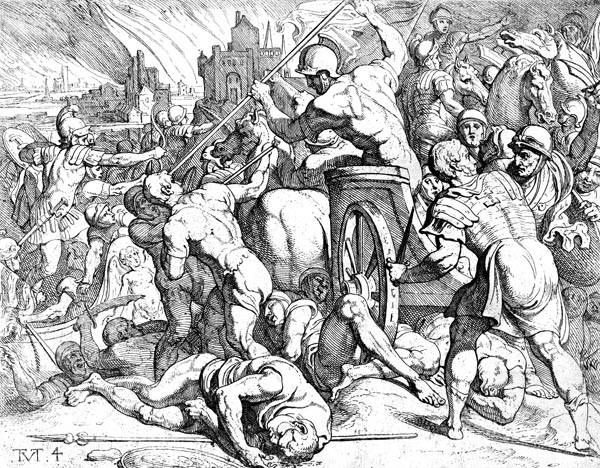
‘Odysseus' battle with the Cicones’
BkIX:63-104 Odysseus tells his tale: The Lotus-Eaters
‘From Ismarus we sailed, with heavy hearts for the loyal friends lost, though happy to have escaped death ourselves: nor would I let the curved ships leave till we had called three times in ritual to each of our luckless comrades, who died there on the plain, at the hands of the Cicones. But Zeus, the Cloud-Gatherer, stirred the north wind against our ships, in a blinding tempest, hiding the land and sea alike in cloud, while darkness swept from the sky. Headlong the ships were driven, sails torn to shreds by the force of the gale. In terror of death we lowered the masts on deck, and rowed the vessels wildly towards land.
There we stayed for two days and nights, troubled at heart with weariness and grief. But when Dawn of the lovely tresses gave birth to the third day, we upped masts, hoisted the white sails, and took our seats aboard, and the wind and helmsman kept us on course. Now I would have reached home safely, but as I was rounding Cape Malea, the north wind and waves and the ocean currents beat me away, off course, past Cythera.
For nine days I was driven by fierce winds over the teeming sea: but on the tenth we set foot on the shores of the Lotus-eaters, who eat its flowery food. On land we drew water, and my friends ate by the ships. Once we had tasted food and drink, I sent some of the men inland to discover what kind of human beings lived there: selecting two and sending a third as herald. They left at once and came upon the Lotus-eaters, who had no thought of killing my comrades, but gave them lotus to eat. Those who ate the honey-sweet lotus fruit no longer wished to bring back word to us, or sail for home. They wanted to stay with the Lotus-eaters, eating the lotus, forgetting all thoughts of return. I dragged those men back to the shore myself by force, while they wept, and bound them tight in the hollow ships, pushing them under the benches. Then I ordered my men to embark quickly on the fast craft, fearing that others would eat the lotus and forget their homes. They boarded swiftly and took their place on the benches then sitting in their rows struck the grey water with their oars.’
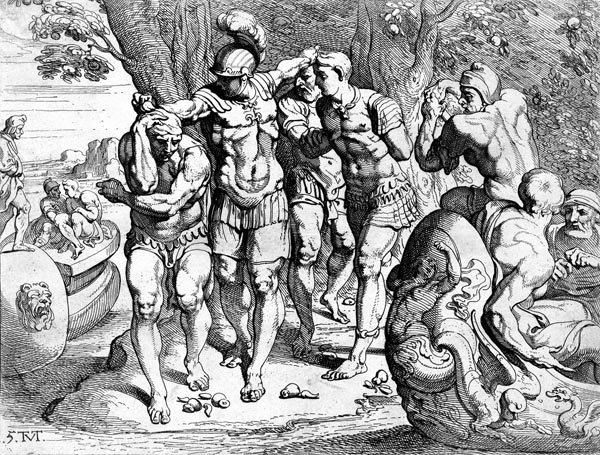
‘Odysseus in the Land of the Lotus Eaters’
BkIX:105-151 Odysseus tells his tale: The Land of the Cyclopes
‘From there we sailed with heavy hearts, and came to the land of the Cyclopes, a lawless, aggressive people, who never lift their hands to plant or plough, but rely on the immortal gods. Wheat, barley, and vines with their richly clustered grapes, grow there without ploughing or sowing, and rain from Zeus makes them flourish. The Cyclopes have no council meetings, no code of law, but live in echoing caves on the mountain slopes, and each man lays down the law to his wives and children, and disregards his neighbours.
A fertile island lies slantwise outside the Cyclopes’ harbour, well wooded and neither close to nor far from shore. Countless wild goats inhabit it, since there is nothing to stop them, no hunters to suffer the hardship of beating a path through its woods, or to roam its mountaintops. There are no flocks, and no ploughed fields: but always unsown, and untilled it is free of mankind and nurtures only bleating goats. The Cyclopes have no vessels with crimson-painted prows, no shipwrights to build sound boats with oars, to meet their need and let them travel to other men’s cities, as other races visit each other over the sea in ships, no craftsmen that is who might also have turned it into a fine colony. For this island is by no means poor, but would carry any crop in due season. There are rich well-watered meadows there, along the shore of the grey sea, where vines would never fail. There is level land for the plough with soil so rich they could reap a dense harvest in season. And there’s a safe harbour where there’s no need for moorings, neither anchor stones nor hawsers: you can beach your ship and wait till the wind is fair and the spirit moves you to sail.
Now, at the head of the harbour a stream of bright water flows out from a cave ringed by poplars. We entered, and some god must have guided us through the murky night, since it was too dark to see, a mist shrouded the ships, and the moon covered with cloud gave not a gleam of light. No one could see the land, or the long breakers striking the beach, until we had run our oared ships aground. Once they were beached we lowered sail and went on shore, then we lay down where we were to sleep, and waited for the light of dawn.’
BkIX:152-192 Odysseus tells his tale: The Cyclops’ Cave
‘As soon as rosy-fingered Dawn appeared, we explored the island, marvelling at what we saw. The Nymphs, daughters of aegis-bearing Zeus, disturbed the mountain goats, driving them towards my hungry comrades. Quickly we brought our curved bows and long spears from the ships, and splitting three ways began to hunt them, and the god soon gave us a fine enough kill. Nine goats were given to each of the twelve ships in my command, and there were ten left for me.
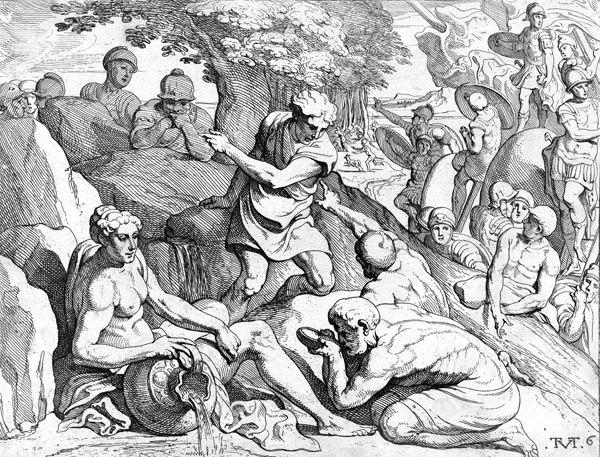
‘Odysseus in the land of the Cyclopes’
So all day long till the sun set we sat and feasted on copious meat and mellow wine, since each of the crews had drawn off a large supply in jars when we took the Cicones’ sacred citadel, and some of the red was left. Looking across to the land of the neighbouring Cyclopes, we could see smoke and hear their voices, and the sound of their sheep and goats. Sun set and darkness fell, and we settled to our rest on the shore.
As soon as rosy-fingered Dawn appeared, I gathered my men together, saying: “The rest of you loyal friends stay here, while I and my crew take ship and try and find out who these men are, whether they are cruel, savage and lawless, or good to strangers, and in their hearts fear the gods.”
With this I went aboard and ordered my crew to follow and loose the cables. They boarded swiftly and took their place on the benches then sitting in their rows struck the grey water with their oars. When we had reached the nearby shore, we saw a deep cave overhung with laurels at the cliff’s edge close to the sea. Large herds of sheep and goats were penned there at night, and round it was a raised yard walled by deep-set stones, tall pines and high-crowned oaks. There a giant spent the night, one that grazed his herds far off, alone, and keeping clear of others, lived in lawless solitude. He was born a monster and a wonder, not like any ordinary human, but like some wooded peak of the high mountains, that stands there isolated to our gaze.’
BkIX:193-255 Odysseus tells his tale: Polyphemus returns
‘Then I ordered the rest of my loyal friends to stay there and guard the ship, while I selected the twelve best men and went forward. I took with me a goatskin filled with dark sweet wine that Maron, son of Euanthes, priest of Apollo guardian god of Ismarus, had given me, because out of respect we protected him, his wife and child. He offered me splendid gifts, seven talents of well-wrought gold, and a silver mixing-bowl: and wine, twelve jars in all, sweet unmixed wine, a divine draught. None of his serving-men and maids knew of this store, only he and his loyal wife, and one housekeeper. When they drank that honeyed red wine, he would pour a full cup into twenty of water, and the bouquet that rose from the mixing bowl was wonderfully sweet: in truth no one could hold back. I filled a large goatskin with the wine, and took it along, with some food in a bag, since my instincts told me the giant would come at us quickly, a savage being with huge strength, knowing nothing of right or law.
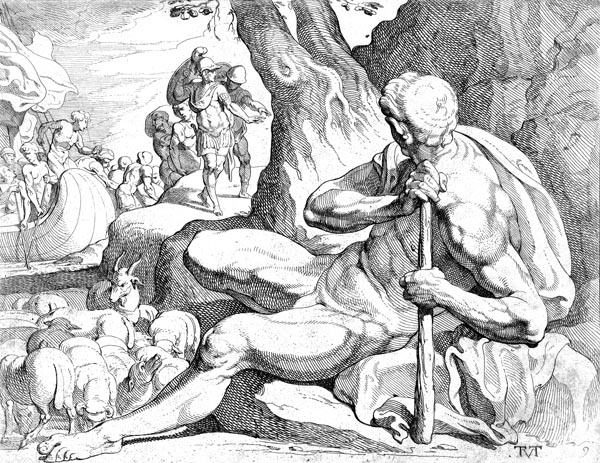
‘Polyphemus guarding his flock’
Soon we came to the cave, and found him absent, he was grazing his well-fed flocks in the fields. So we went inside and marvelled at its contents. There were baskets full of cheeses, and pens crowded with lambs and kids, each flock with its firstlings, later ones, and newborn separated. The pails and bowls for milking, all solidly made, were swimming with whey. At first my men begged me to take some cheeses and go, then to drive the lambs and kids from the pens down to the swift ship and set sail. But I would not listen, though it would have been best, wishing to see the giant himself, and test his hospitality. When he did appear he proved no joy to my men.
So we lit a fire and made an offering, and helped ourselves to the cheese, and sat in the cave eating, waiting for him to return, shepherding his flocks. He arrived bearing a huge weight of dry wood to burn at suppertime, and he flung it down inside the cave with a crash. Gripped by terror we shrank back into a deep corner. He drove his well-fed flocks into the wide cave, the ones he milked, leaving the rams and he-goats outside in the broad courtyard. Then he lifted his door, a huge stone, and set it in place. Twenty-two four-wheeled wagons could not have carried it, yet such was the great rocky mass he used for a door. Then he sat and milked the ewes, and bleating goats in order, putting her young to each. Next he curdled half of the white milk, and stored the whey in wicker baskets, leaving the rest in pails for him to drink for his supper. When he had busied himself at his tasks, and kindled a fire, he suddenly saw us, and said: “Strangers, who are you? Where do you sail from over the sea-roads? Are you on business, or do you roam at random, like pirates who chance their lives to bring evil to others?”’
BkIX:256-306 Odysseus tells his tale: Trapped
‘Our spirits fell at his words, in terror at his loud voice and monstrous size. Nevertheless I answered him, saying; “We are Achaeans, returning from Troy, driven over the ocean depths by every wind that blows. Heading for home we were forced to take another route, a different course, as Zeus, I suppose, intended. We are followers of Agamemnon, Atreus’ son, whose fame spreads widest on earth, so great was that city he sacked and host he slew. But we, for our part, come as suppliant to your knees, hoping for hospitality, and the kindness that is due to strangers. Good sir, do not refuse us: respect the gods. We are suppliants and Zeus protects visitors and suppliants, Zeus the god of guests, who follows the steps of sacred travellers.”
His answer was devoid of pity. “Stranger, you are a foreigner or a fool, telling me to fear and revere the gods, since the Cyclopes care nothing for aegis-bearing Zeus: we are greater than they. I would spare neither you nor your friends, to evade Zeus’ anger, but only as my own heart prompted.
But tell me, now, where you moored your fine ship, when you landed. Was it somewhere nearby, or further off? I’d like to know.”
His words were designed to fool me, but failed. I was too wise for that, and answered him with cunning words: “Poseidon, Earth-Shaker, smashed my ship to pieces, wrecking her on the rocks that edge your island, driving her close to the headland so the wind threw her onshore. But I and my men here escaped destruction.”
Devoid of pity, he was silent in response, but leaping up laid hands on my crew. Two he seized and dashed to the ground like whelps, and their brains ran out and stained the earth. He tore them limb from limb for his supper, eating the flesh and entrails, bone and marrow, like a mountain lion, leaving nothing. Helplessly we watched these cruel acts, raising our hands to heaven and weeping. When the Cyclops had filled his huge stomach with human flesh, and had drunk pure milk, he lay down in the cave, stretched out among his flocks. Then I formed a courageous plan to steal up to him, draw my sharp sword, and feeling for the place where the midriff supports the liver, stab him there. But the next thought checked me. Trapped in the cave we would certainly die, since we’d have no way to move the great stone from the wide entrance. So, sighing, we waited for bright day.’
BkIX:307-359 Odysseus tells his tale: Offering the Cyclops wine
‘As soon as rosy-fingered Dawn appeared, Cyclops relit the fire. Then he milked the ewes, and bleating goats in order, putting her young to each. When he had busied himself at his tasks, he again seized two of my men and began to eat them. When he had finished he drove his well-fed flocks from the cave, effortlessly lifting the huge door stone, and replacing it again like the cap on a quiver. Then whistling loudly he turned his flocks out on to the mountain slopes, leaving me with murder in my heart searching for a way to take vengeance on him, if Athene would grant me inspiration. The best plan seemed to be this:
The Cyclops’ huge club, a trunk of green olive wood he had cut to take with him as soon as it was seasoned, lay next to a sheep pen. It was so large and thick that it looked to us like the mast of a twenty-oared black ship, a broad-beamed merchant vessel that sails the deep ocean. Approaching it, I cut off a six-foot length, gave it to my men and told them to smooth the wood. Then standing by it I sharpened the end to a point, and hardened the point in the blazing fire, after which I hid it carefully in a one of the heaps of dung that lay around the cave. I ordered the men to cast lots as to which of them should dare to help me raise the stake and twist it into the Cyclops’ eye when sweet sleep took him. The lot fell on the very ones I would have chosen, four of them, with myself making a fifth.
He returned at evening, shepherding his well-fed flocks. He herded them swiftly, every one, into the deep cave, leaving none in the broad yard, commanded to do so by a god, or because of some premonition. Then he lifted the huge door stone and set it in place, and sat down to milk the ewes and bleating goats in order, putting her young to each. But when he had busied himself at his tasks, he again seized two of my men and began to eat them. That was when I went up to him, holding an ivy-wood bowl full of dark wine, and said: “Here, Cyclops, have some wine to follow your meal of human flesh, so you can taste the sort of drink we carried in our ship. I was bringing the drink to you as a gift, hoping you might pity me and help me on my homeward path: but your savagery is past bearing. Cruel man, why would anyone on earth ever visit you again, when you behave so badly?”
At this, he took the cup and drained it, and found the sweet drink so delightful he asked for another draught: “Give me more, freely, then quickly tell me your name so I may give you a guest gift, one that will please you. Among us Cyclopes the fertile earth produces rich grape clusters, and Zeus’ rain swells them: but this is a taste from a stream of ambrosia and nectar.”’
BkIX:360-412 Odysseus tells his tale: Blinding the Cyclops
‘As he finished speaking I handed him the bright wine. Three times I poured and gave it to him, and three times, foolishly, he drained it. When the wine had fuddled his wits I tried him with subtle words: “Cyclops, you asked my name, and I will tell it: give me afterwards a guest gift as you promised. My name is Nobody. Nobody, my father, mother, and friends call me.”
Those were my words, and this his cruel answer: “Then, my gift is this. I will eat Nobody last of all his company, and all the others before him”.
As he spoke, he reeled and toppled over on his back, his thick neck twisted to one side, and all-conquering sleep overpowered him. In his drunken slumber he vomited wine and pieces of human flesh. Then I thrust the stake into the depth of the ashes to heat it, and inspired my men with encouraging words, so none would hang back from fear. When the olivewood stake was glowing hot, and ready to catch fire despite its greenness, I drew it from the coals, then my men stood round me, and a god breathed courage into us. They held the sharpened olivewood stake, and thrust it into his eye, while I threw my weight on the end, and twisted it round and round, as a man bores the timbers of a ship with a drill that others twirl lower down with a strap held at both ends, and so keep the drill continuously moving. We took the red-hot stake and twisted it round and round like that in his eye, and the blood poured out despite the heat. His lids and brows were scorched by flame from the burning eyeball, and its roots crackled with fire. As a great axe or adze causes a vast hissing when the smith dips it in cool water to temper it, strengthening the iron, so his eye hissed against the olivewood stake. Then he screamed, terribly, and the rock echoed. Seized by terror we shrank back, as he wrenched the stake, wet with blood, from his eye. He flung it away in frenzy, and called to the Cyclopes, his neighbours who lived in caves on the windy heights. They heard his cry, and crowding in from every side they stood by the cave mouth and asked what was wrong: “Polyphemus, what terrible pain is this that makes you call through deathless night, and wake us? Is a mortal stealing your flocks, or trying to kill you by violence or treachery?”
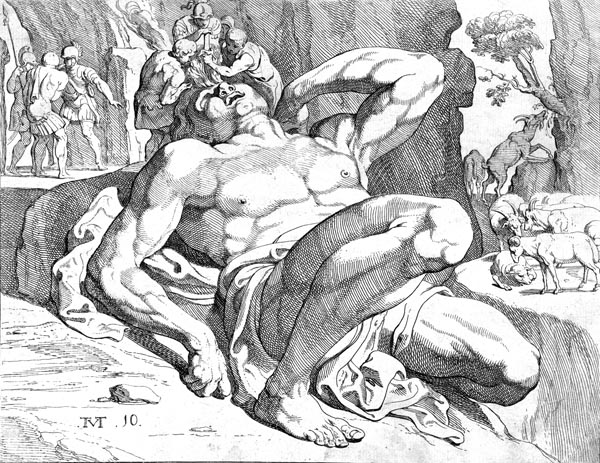
‘The blinding of Polyphemus’
Out of the cave came mighty Polyphemus’ voice: “Nobody, my friends, is trying to kill me by violence or treachery.”
To this they replied with winged words: “If you are alone, and nobody does you violence, it’s an inescapable sickness that comes from Zeus: pray to the Lord Poseidon, our father.”
BkIX:413-479 Odysseus tells his tale: Escape
‘Off they went, while I laughed to myself at how the name and the clever scheme had deceived him. Meanwhile the Cyclops, groaning and in pain, groped around and laboured to lift the stone from the door. Then he sat in the entrance, arms outstretched, to catch anyone stealing past among his sheep. That was how foolish he must have thought I was. I considered the best way of escaping, and saving myself, and my men from death. I dreamed up all sorts of tricks and schemes, as a man will in a life or death matter: it was an evil situation. This was the plan that seemed best. The rams were fat with thick fleeces, fine large beasts with deep black wool. These I silently tied together in threes, with twists of willow on which that lawless monster, Polyphemus, slept. The middle one was to carry one of my men, with the other two on either side to protect him. So there was a man to every three sheep. As for me I took the pick of the flock, and curled below his shaggy belly, gripped his back and lay there face upwards, patiently gripping his fine fleece tight in my hands. Then, sighing, we waited for the light.
As soon as rosy-fingered Dawn appeared, the males rushed out to graze, while the un-milked females udders bursting bleated in the pens. Their master, tormented by agonies of pain, felt the backs of the sheep as they passed him, but foolishly failed to see my men tied under the rams’ bellies. My ram went last, burdened by the weight of his fleece, and me and my teeming thoughts. And as he felt its back, mighty Polyphemus spoke to him:
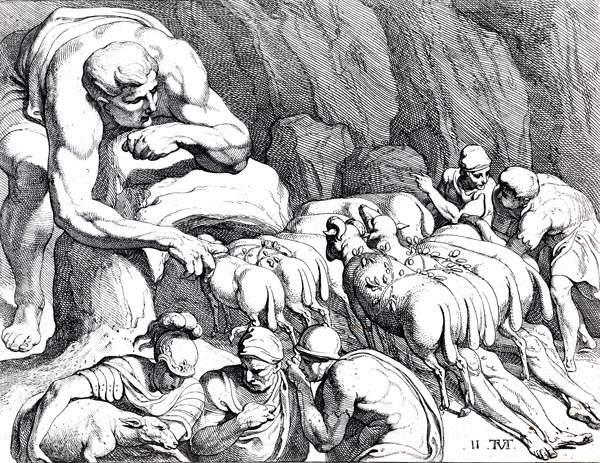
‘Odysseus escaping from the cave of Polyphemus’
“My fine ram, why leave the cave like this last of the flock? You have never lagged behind before, always the first to step out proudly and graze on the tender grass shoots, always first to reach the flowing river, and first to show your wish to return at evening to the fold. Today you are last of all. You must surely be grieving over your master’s eye, blinded by an evil man and his wicked friends, when my wits were fuddled with wine: Nobody, I say, has not yet escaped death. If you only had senses like me, and the power of speech to tell me where he hides himself from my anger, then I’d strike him down, his brains would be sprinkled all over the floor of the cave, and my heart would be eased of the pain that nothing, Nobody, has brought me.”
With this he drove the ram away from him out of doors, and I loosed myself when the ram was a little way from the cave, then untied my men. Swiftly, keeping an eye behind us, we shepherded those long-limbed sheep, rich and fat, down to the ship. And a welcome sight, indeed, to our dear friends were we, escapees from death, though they wept and sighed for the others we lost. I would not let them weep though, but stopped them all with a nod and a frown. I told them to haul the host of fine-fleeced sheep on board and put to sea. They boarded swiftly and took their place on the benches then sitting in their rows struck the grey water with their oars. When we were almost out of earshot, I shouted to the Cyclops, mocking him: “It seems he was not such a weakling, then, Cyclops, that man whose friends you meant to tear apart and eat in your echoing cave. Stubborn brute not shrinking from murdering your guests in your own house, your evil deeds were bound for sure to fall on your own head. Zeus and the other gods have had their revenge on you.”’
BkIX:480-525 Odysseus tells his tale: Telemus’ prophecy
‘He was enraged all the more by my words, and shattering the crest of a tall cliff, he hurled it at us, so that it fell seaward of our blue-prowed vessel, and almost struck the steering oar. The water surged beneath the stone as it fell, and the backwash like a tidal swell from the open sea, carried the ship landward and drove it onto the shore. But seizing a long pole in my hands, I pushed the boat off, and rousing my men ordered them with urgent signs to bend to the oars and save us from disaster. They bent to their oars and rowed, but as soon as we had put water behind us and doubled our distance I began shouting to the Cyclops, though the men round me called out on every side, trying to deter me with their appeals: “Why provoke the savage to anger in this stubborn way? The rock he threw into the sea just now drove the ship back on shore, and we thought we were done for. If he had been able to hear us speak but a word, he would have hurled another jagged stone, and crushed our heads and the ship’s timbers with the power of his throw.”
So they argued, but could not daunt my ardent spirit, and I shouted to him again in anger: “Cyclops, if any man asks how you came by your blindness, say that Odysseus, sacker of cities, Laertes’ son, a native of Ithaca, maimed you.”
At this he groaned, and said in answer: “Alas! The truth of that prophecy spoken long ago is fulfilled! Telemus, the seer, son of Eurymus, a tall fine man, lived here once, the greatest of prophets, and grew old here as soothsayer among the Cyclopes. He told me that all of this would come to pass one day, and I would lose my sight at Odysseus’ hands. But I always expected some tall fine man, one of great strength, and now a puny good-for-nothing weakling blinds my eye, after plying me with wine. Come here, Odysseus, nevertheless, so that I might grant you guest gifts, and urge the great Earth-Shaker to see you home, since I am his son, and he says he is my father, and he, of his will, can heal me, where no other of the blessed gods or men can.”
I replied, saying: “I wish I could rob you of life and spirit, and send you to the House of Hades, as surely as the Earth-Shaker will fail to heal your eye.”’
BkIX:526-566 Odysseus tells his tale: Polyphemus’ curse
‘At my words, he stretched out his hands to the starry heavens, and prayed to the Lord Poseidon: ‘Hear me, Poseidon, dark-tressed Earth-Bearer, if I am your son, if you say you are my father, let Odysseus, sacker of cities and son of Laertes, never reach his home on Ithaca: yet if he is destined to see his friends and his fine house in his own country, may he come there late and in sore distress, in another’s ship, losing all comrades, and let him find great trouble in his house.”
So he prayed, and the dark-tressed god heard him. Then the Cyclops lifted an even larger rock, swung it in the air, and hurled it, with all his strength. It fell not far behind our blue-prowed ship, narrowly missing the tip of the steering oar, and the sea surged up around the falling stone, and its wave carried the ship forward and drove it to the far shore.
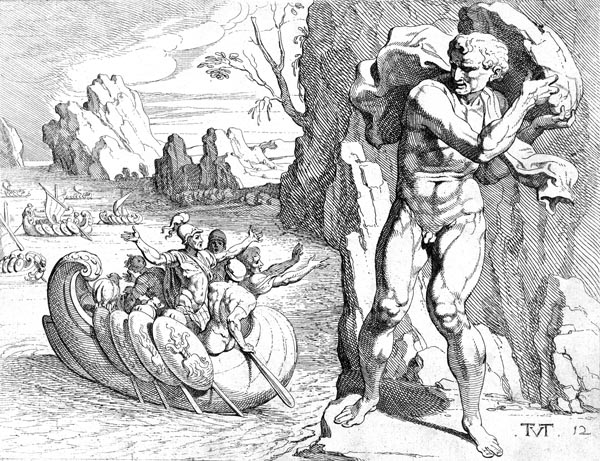
‘Polyphemus hurls a rock at Odysseus' ship’
So we reached the island where our other oared ships lay, with our friends round them, watching for us, and weeping. There we beached our vessel, and went on shore. We landed the Cyclops’ flocks from the hold and divided them among us, so that as far as I could determine no man lacked an equal share. The ram my comrades in arms granted to me, as a separate gift, and when the flocks had been divided there on the shore I sacrificed to Zeus of the dark clouds, son of Cronos, lord of all, and I burned the thigh pieces. But he ignored my sacrifice, planning instead the destruction of my oared ships and my faithful friends.
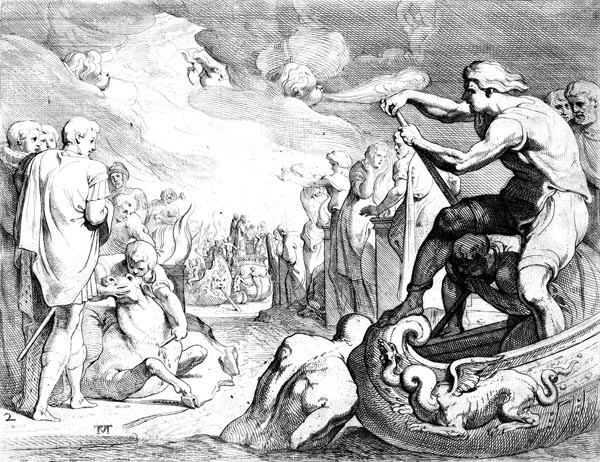
‘Odysseus sacrifices to the Gods’
All day long till sunset we sat feasting on our plentiful supplies of meat and sweet wine, and when the sun was down and darkness fell we settled to sleep on the sand. As soon as rosy-fingered Dawn appeared, I roused my men, and ordered them to embark and loose the hawsers. They boarded swiftly and took their place on the benches then sitting in their rows struck the grey water with their oars.
So we sailed on, with heavy hearts for the loyal friends lost, though happy to have escaped death ourselves.’